Introduction
How To Hold A Guinea Pig: Guinea pigs, those small and adorable rodents, have long been cherished as beloved pets by people around the world. Their gentle nature, expressive personalities, and distinctive squeaks make them endearing companions. However, to ensure the well-being of your guinea pig and cultivate a harmonious relationship, it’s essential to learn the art of holding them properly. Holding a guinea pig may seem straightforward, but there are nuances to consider to ensure their safety and comfort. The fundamental principles of how to hold a guinea pig with care and confidence. Whether you’re a first-time guinea pig owner or looking to refine your handling techniques, understanding the basics is crucial.
Before it’s essential to handle guinea pigs symbolize handling. These small creatures can be quite fragile, and improper handling can lead to stress, injury, or even long-term anxiety. By learning the right way to hold them, you not only protect their physical well-being but also nurture a bond based on trust and security. Guinea pigs, known scientifically as Cavia are part of the Caviidae family and originated from the Andes region of South America. They are not true pigs but are rather rodents, closely related to chinchillas and porcupines.
Their domestication over the centuries has resulted in a wide variety of coat colors, hair textures, and patterns, making them all the more appealing as pets. The significance of handling your guinea pig appropriately extends beyond mere physical contact. It’s an opportunity to create a deeper connection with your furry friend and engage in meaningful interaction. By understanding their body language, preferences, and comfort zones, you can make the experience enjoyable for both you and your guinea pig.
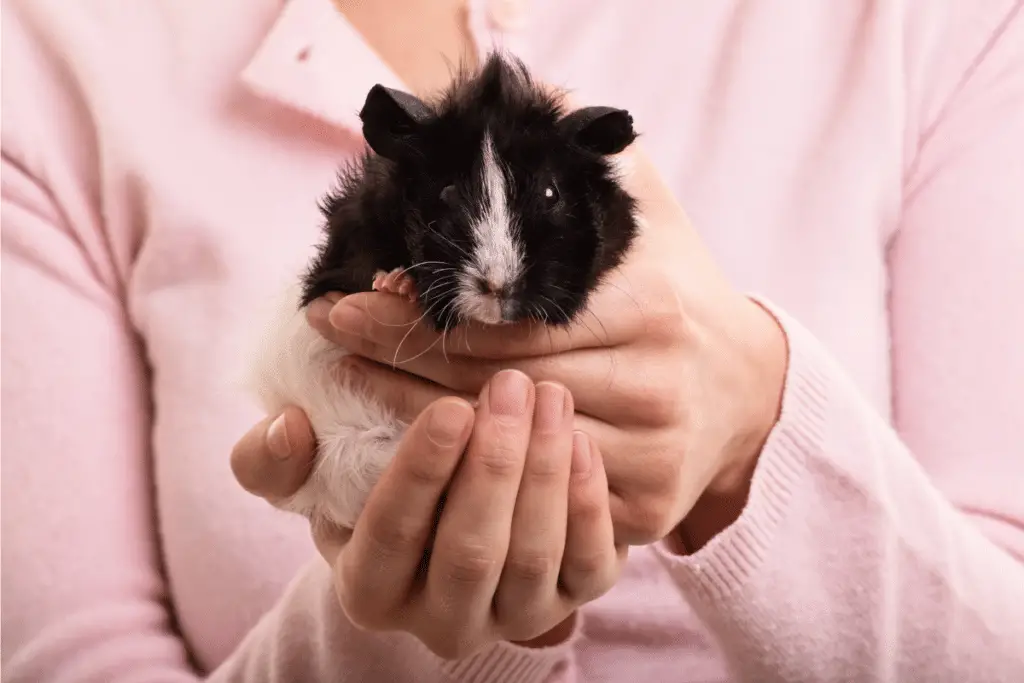
Do guinea pigs like when you hold them?
Depending on the breed and personality, one guinea pig may enjoy being cuddled straight away, while another may take a few months before it enjoys any human interaction. And then there are those that simply never get used to it at all.
Socialization: Guinea pigs are social animals that thrive on interaction with their human caregivers. They can form strong bonds with their owners and may even seek out your company. If your guinea pig is well-socialized from a young age and has positive experiences with handling, they are more likely to enjoy being held.
Trust and Familiarity: Trust is vital in any relationship, and it’s no different with guinea pigs. Building trust takes time, patience, and consistency. If your guinea pig associates being held with positive experiences like treats, gentle petting, and a secure environment, they are more likely to feel comfortable in your hands.
Handling Techniques: How you hold your guinea pig matters. Always use both hands to support their body, keeping them close to your chest to a sense of security. Avoid sudden movements, loud noises, or anything that might startle them. Gradually introduce them to being held, starting with short sessions and gradually increasing the duration as they become more comfortable.
Body Language: Pay attention to your guinea pig’s body language. Signs of stress or discomfort include rapid breathing, trembling, vocalizations, and attempts to escape. If your guinea pig displays these signs when you pick them up, it’s best to gently place them back in their enclosure and try again later.
How do you handle a guinea pig?
Use one hand to stop the guinea pig running forwards, and the other to stop them backing up. Place one hand under the guinea pig’s chest and abdomen, and the other supports its hindquarters and weight. Many guinea pigs like to be propped up against your chest for security and comfort.
Be Gentle: Treat your guinea pig with utmost gentleness. Avoid squeezing or gripping too tightly, as they have delicate bones and can become injured easily. If your guinea pig feels uncomfortable, they may struggle or vocalize their distress.
Read Their Body Language: Pay attention to your guinea pig’s body language. If they show signs of stress, like rapid breathing, trembling, or attempts to escape, it’s best to put them back in their enclosure and try again later.
Keep Them Close: Holding your guinea pig, keep them close to your body to help them feel secure. Avoid holding them too high above the ground to prevent accidental falls.
Short Sessions: Especially when you’re first your guinea pig to handle, keep the sessions short and gradually increase the duration as they become more comfortable. Reward them with a treat and soothing words after each handling session to create positive associations.
What do guinea pigs fear the most?
Fears of toys, people, and loud noises are the most common fears. There are many reasons why a guinea pig may develop fears of people. For example, a bad experience with a small child could result in a guinea pig that is fearful of all small children.
Loud Noises: Guinea pigs have sensitive hearing, and loud noises can startle and stress them. Common sources of loud noises include vacuum cleaners, blaring music, or sudden claps of thunder. To minimize their fear, keep their living space in a quiet and peaceful area of your home.
Predators: Guinea pigs are prey animals in the wild, and their instinctual fear of predators is deeply ingrained. Even in a domestic setting, they may become anxious when they perceive a potential threat. This could include the presence of larger animals like dogs or cats. Always supervise interactions with other pets to ensure their safety.
Sudden Movements: Guinea pigs are cautious by nature, and sudden movements can make them feel threatened. Quick or jerky motions, especially when reaching to pick them up, can cause them stress. Approach them slowly and calmly to minimize this fear.
Handling: Some guinea pigs may become accustomed to handling and enjoy it, others may fear being picked up. It’s essential to be gentle and patient when handling your guinea pig, especially if they are not used to it. Gradual and positive experiences can help reduce this fear over time.
Why do guinea pigs hate being touched?
The reason why guinea pigs don’t like their bellies or backs being touched is because it feels unexpected to them. When they are being touched on their belly or bottom, it often reminds them of predator-like behavior.
Natural Instincts: Guinea pigs are prey animals in the wild, and their natural instincts tell them to be cautious and alert to potential threats. Being touched or held can trigger these instincts, leading to fear and stress in some guinea pigs.
Lack of Socialization: Guinea pigs that have not been properly socialized from a young age may not be accustomed to human touch. This lack of exposure can result in discomfort or fear when handled.
Past Negative Experiences: Guinea pigs have excellent memories and can past experiences, especially if they were negative. If a guinea pig has had a traumatic or stressful experience when being held or touched, they may develop an aversion to it.
Individual Personality: Just like humans, guinea pigs have unique personalities. Some guinea pigs may be outgoing and enjoy interaction, others may be more reserved and prefer to observe from a distance. Respect their individual preferences and comfort levels.
What keeps guinea pigs happy?
Guinea pig behaviour. Make sure your guinea pig stays happy and healthy, by giving them access to the things they need at all times – including space, food, water, safe hiding places, companion guinea pig(s) and toys. They’re inquisitive animals, and without enough to do, they may get bored and suffer.
Companionship: Guinea pigs are highly social animals that thrive on companionship. They are happiest when they have a same-species friend to interact with. A solo guinea pig can become lonely and stressed, so it’s advisable to keep them in pairs or small groups.
Adequate Cage Space: Guinea pigs need a spacious living environment to explore, play, and establish territories. A larger cage allows them to exercise and prevents boredom. The minimum size for two guinea pigs is about 7.5 square feet, but more space is always better.
Proper Diet: A balanced and nutritious diet is crucial for a guinea pig’s well-being. High-quality hay, fresh vegetables, and a good guinea pig pellet to meet their dietary needs. Fresh water should always be available.
Clean Environment: Guinea pigs are sensitive to odors and thrive in a clean and hygienic environment. Regularly clean their cage, change bedding, and remove soiled hay and food to prevent odor buildup and maintain a healthy living space.
Can I hold my guinea pig everyday?
Guinea pigs need time out of their cage every day. Whether this time is spent stretching their legs and exploring new environments or cuddling in your lap, daily interaction and attention are essential for a guinea pig’s well-being.
Guinea Pig’s Personality: The willingness of a guinea pig to be held and the frequency with which they enjoy it can vary widely from one individual to another. Just like people, guinea pigs have distinct personalities. Some may be naturally more outgoing and receptive to handling, others may be more reserved and prefer limited interaction. It’s crucial to respect your guinea pig’s preferences and comfort level.
Gradual Socialization: If you have a new guinea pig, especially a young one, it’s start the socialization process gradually. Begin with short, gentle handling sessions to allow your guinea pig to become accustomed to human touch. As they become more comfortable, you can gradually increase the duration and frequency of handling.
Signs of Stress: Pay close attention to your guinea pig’s body language when you handle them. Signs of stress may include rapid breathing, trembling, vocalizations, or attempts to escape. If your guinea pig exhibits these signs, it’s essential to respect their discomfort and return them to their enclosure to alleviate stress.
Age and Health Considerations: Young guinea pigs may have more energy and curiosity, making them more receptive to frequent handling. However, older or ailing guinea pigs may prefer less frequent interaction or shorter handling sessions due to physical limitations or discomfort. Always consider your guinea pig’s age and overall health when determining the appropriate handling frequency.
Can I hold my guinea pig first day?
Guinea pigs are quite sociable and generally enjoy being held and petted, but it may take time to get to that point. Avoid handling them for a few days after you bring them home, so they have time to adjust to their new surroundings.
Stress and Adjustment: The first day in a new home can be stressful for guinea pigs. They are in an unfamiliar environment with new sights, sounds, and smells. It’s essential to allow them time to adjust to their surroundings and reduce the initial stress they may experience.
Individual Personality: Guinea pigs, like humans, have individual personalities. Some guinea pigs may be naturally more outgoing and adaptable, others may be more shy and reserved. Their readiness for interaction can vary widely.
Health and Previous Experiences: If you’ve acquired your guinea pig from a reputable source or rescue organization, they may have had previous experiences with handling. However, if your guinea pig has had a particularly stressful or traumatic journey to your home, they may need additional time to recover and feel safe.
Observe and Assess: Spend time observing your new guinea pig without attempting to handle them. Allow them to explore their enclosure and get used to their surroundings. This can help you gauge their comfort level and temperament.
What calms a guinea pig?
Avoid known stressors. House guinea pigs in a quiet area away from other pets or activity. Limit the number of animals in each enclosure to prevent overcrowding, and don’t change their social groups too often. Follow a consistent routine for daily care.
Companionship: Guinea pigs are social animals and often find comfort in the presence of their own kind. Housing them with a same-species companion can reduce loneliness and stress. If you have a single guinea pig, consider adopting another to companionship.
Safe and Secure Housing: Guinea pigs need a spacious and secure enclosure. A cage that is too small can lead to stress and boredom. Ensure that the cage is well-ventilated, with a solid bottom and safe hiding spots for your guinea pigs to retreat to when they feel threatened or anxious.
Proper Diet: A well-balanced diet is crucial for a guinea pig’s health and emotional well-being. Providing fresh hay, fresh vegetables, high-quality guinea pig pellets, and clean water is essential. A diet that meets their nutritional needs can contribute to a calm and contented guinea pig.
Quiet Environment: Guinea pigs have sensitive hearing, and loud noises can startle and stress them. Keep their living space in a quiet and peaceful area of your home, away from sources of noise such as television, loud music, or machinery.
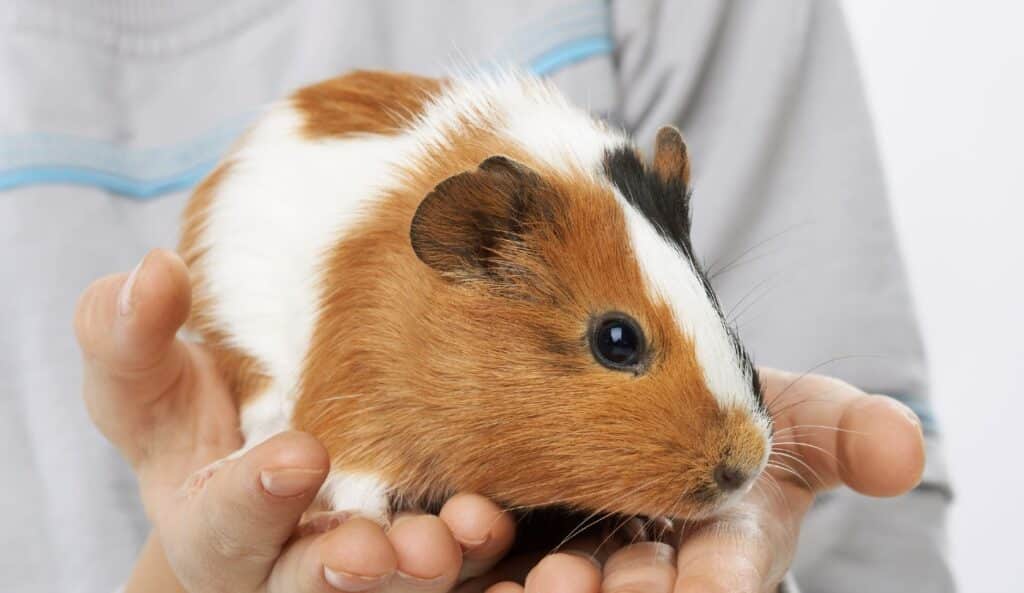
Conclusion
Mastering the art of holding a guinea pig is a vital skill for any responsible pet owner. It goes beyond the physical act of lifting and carrying your furry friend; it’s about understanding their needs, building trust, and nurturing a bond based on care and respect. Throughout this emphasized the gentle handling, proper techniques, and the significance of reading your guinea pig’s language. By following these ensure your guinea pig’s safety, comfort, and overall well-being. One of the most crucial aspects of guinea pig handling is recognizing that each guinea pig is unique.
They have their personalities, preferences, and comfort levels. Some guinea pigs may be more outgoing and receptive to handling, others may be more reserved and require patience to build trust. The key is to respect their individuality and adapt your approach accordingly. The time spent holding your guinea pig is an opportunity for quality bonding. It’s a chance to communicate affection, mental stimulation, and create a sense of security for your pet. That trust is earned over time, so be patient and consistent in your interactions.
Always prioritize safety when handling your guinea pig. Ensure that you’re in a quiet and secure environment to minimize stress and the risk of escape. Be cautious with young children or inexperienced handlers and supervise their interactions with your guinea pig closely. Lastly, never forget that guinea pigs thrive on companionship. They are social animals and benefit from having a companion of their own kind. If possible, consider getting a pair of guinea pigs to with the companionship they need to lead happy and fulfilled lives.

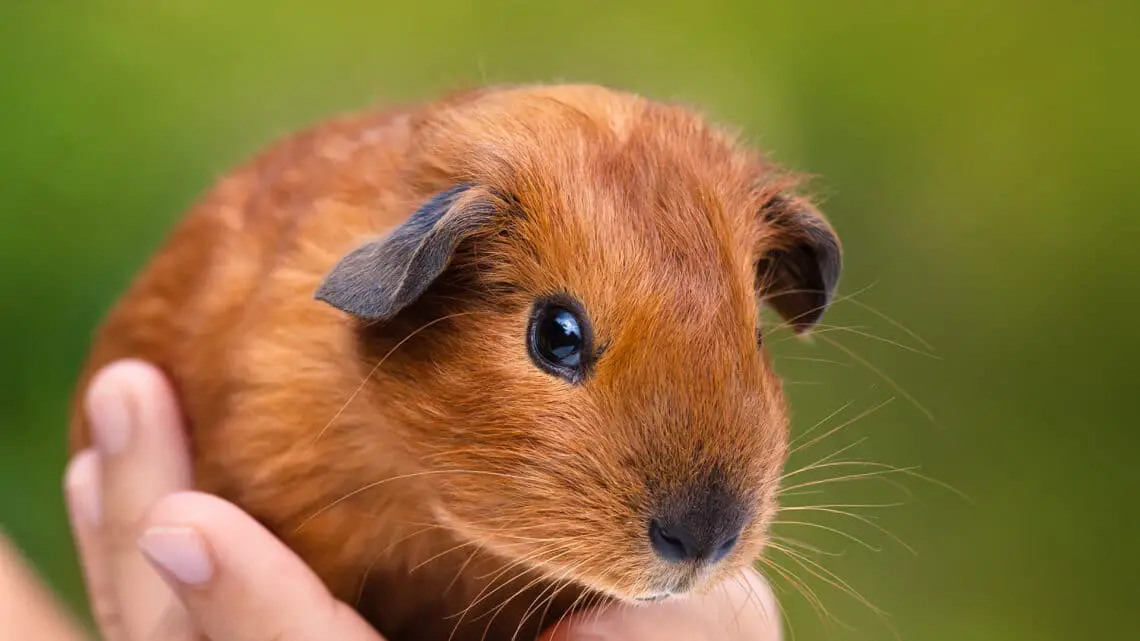

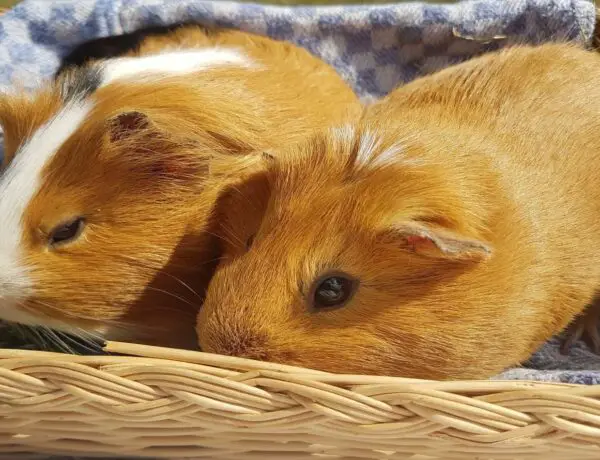
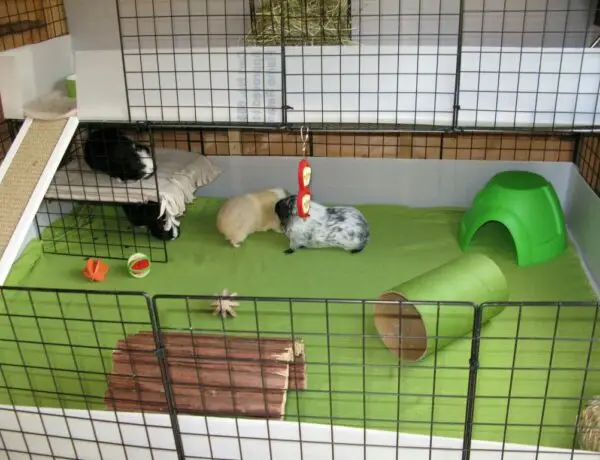
No Comments